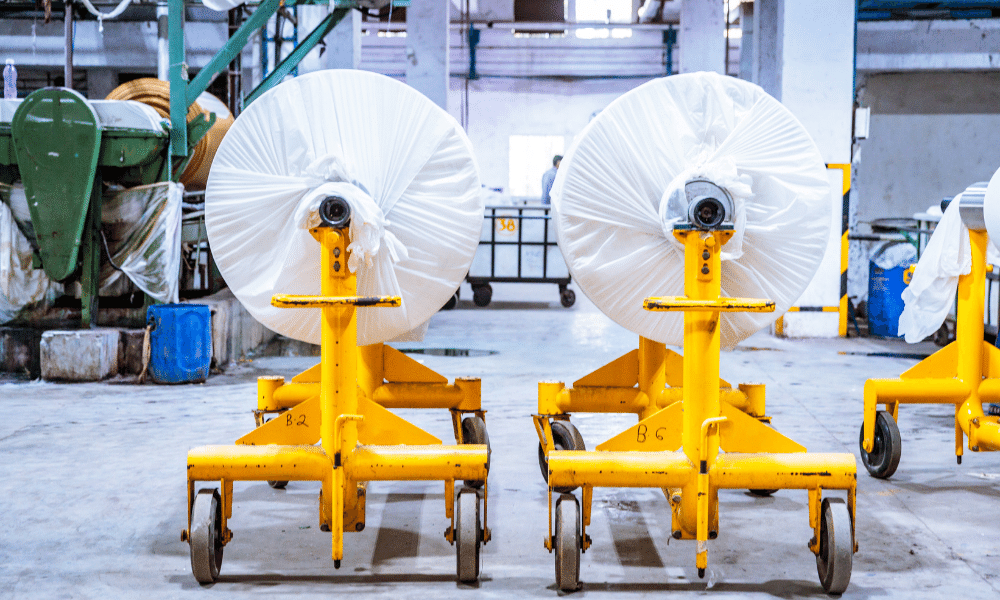What is Cotton Textile Industry and How to Start it?

The textile industry is an ever-blooming industry; with trends changing fast and people, yearning for new designs every day, the demand for apparel is always high. If you are an entrepreneur looking to enter the fashion industry, the time cannot be riper. Undoubtedly, it will be a smart investment today.
India’s Textile Industry
India’s textile industry is one of the largest in the world, and there is no better place than India to start a textile business. The close linkage between the textile industry and farming is also an important factor in the industry’s rapid growth in India.
India also has a rich heritage of textiles, and its industry is again one of the oldest in the world that is highly diverse. You can find hand-woven and hand-spun textiles on one end of the country and sophisticated textile mills on the other end.
The capacity of the Indian textile industry is pretty huge; the country has the capability to produce a large variety of apparel for different market segments, that too both locally and for other countries.
What is Cotton Textile Industry?
As the name suggests, it is responsible for taking cotton and spinning it into yarn that is later used to create a fabric. Cotton has a great demand in a tropical countries like India.
Cotton is also one of the most important raw materials traditionally obtained through country farming. Since there is a huge market (due to demand and availability), starting a cotton textile business today might be a great idea.
In this post, we will first understand a bit about the cotton textile industry in India and then move on to the different steps involved in starting a cotton textile business in India.
Overview of the Cotton Textile Industry in India
The cotton textile industry plays a very dominant role in the Indian textile industry. India is one of the largest exporters and producers of cotton yarn.
Here are some interesting stats about the cotton industry according to Statista-
- India’s value of cotton and cotton products exported was around ₹720 billion in 2021.
- India produced 6126 thousand metric tons of cotton in 2020-2021, making the country the second-largest cotton producer.
- The Indian textile industry contributes around 5% to the country’s GDP, covering over 14% of the production and 11% of total export earnings.
- Apart from being one of the biggest exporters, the industry also stands as the country’s second largest employer (only next to agriculture).
- The textile industry employs over 5.1 crore people directly and 6.8 crore people indirectly. The industry also employs a huge number of unskilled women.
Indian states that are the biggest cotton producers include Gujarat, Telangana, Karnataka, Haryana, Punjab, Maharashtra, Andhra Pradesh, Madhya Pradesh, and Rajasthan.
Some More Stats-
- Fabrics and cotton yarn exports alone account for over 23% of the total apparel and textile exports of India.
- In the year 2019-20, exports of cotton made-ups, cotton yarn, handlooms, and cotton fabrics accounted for $10.01 billion.
- In FY21, the total exports of cotton yarn, made-ups, fabrics, and handloom products had reached $9.81 billion, and during the March of 2021 alone, the exports were worth $1.10 billion.
- In FY21, India’s overall cotton production was estimated to be ~360 lakh barrels.
Why did the Cotton Textile Industry Rapidly Expand in Mumbai?
The first cotton textile industry was set up in Bombay in 1854 and soon it grew rapidly. This was because of multiple reasons. Firstly, because of the high humidity and hot climate of Bombay, more and more people started buying cotton as it was the most suitable textile for them to wear in these climatic circumstances.

Secondly, the raw material was also easily available in part of the city. And lastly, since the port was located in Mumbai, the import and export were easily done without any hassle. Apart from this, skilled labor was easily available which further helped in expansion.
How to Start a Cotton Textile Industry in India?
Now that you know how promising the sector is let us look into the different steps involved in starting a Cotton Textile Industry in India-
Step 1- Research the Market
The first step of starting any business is to understand the market thoroughly. Analyze the present cotton textile market and find out the demand and supply. A plethora of products can be manufactured using cotton, so find which product has the highest demand.
Initially, you can choose a single product to concentrate on. Once you start getting good business, you can start focusing on other popular cotton products in the market.
Then understand your competition; find the existing players in the market and know their business strategy. Good competitor analysis and research can give you a great push for your cotton business in the initial days.
Step 2- Decide on the Size of the Business
Many new entrepreneurs try to go overboard while crafting a business plan. They set highly unrealistic targets and repent later. Remember – it takes time for a business to grow. You cannot create a vast customer base in weeks or months. So set realistic targets.
Also, by picking a dynamic sector like cotton, you have signed up for a huge investment of time and effort. It also means you have to dedicate a large sum of money to build a strong base for your cotton business initially.
So before you start the textile business, find the actual investment that you can make and what is the best way to get the remaining funds. Based on these aspects, you can choose the size of your business.
Step 3- Generate Investment/Funds for the Business
As highlighted in the previous point, starting a cotton business will require a sizable amount of investment which you need to arrange. The investment would be primarily for the land, buying cotton, labour, and marketing.
It’s important that you sit and plan on what would be the cost of each of these components and how much operating capital you should have. Based on the answers, you need to generate funds for the business through loans or investors.
If you are planning on starting a cotton textile manufacturing unit, then the initial investment would include rent/cost of the land, cost of equipment for weaving, knitting, cloth cutting, etc., and labour costs. On the other hand, if you are a cotton clothes retailer, you need funds for shop, inventory maintenance, and transportation.
Step 4- Choose the Right Place
This is a given. You need to choose the best place to run a profitable business. If you plan to start a cotton textile manufacturing unit, then your unit should be strategically placed near a port, as this will be easy for you to transport the manufactured products.
If you are a retailer, your shop should be near the suppliers and customers. This way, you can save a lot on transportation and be visible to your target audience.
You can also set up your shop closer to the customer and have the warehouse near the manufacturer or suppliers to ensure that you have an uninterrupted and hassle-free supply of products.
Step 5- Apply for Licenses and Permits
If you have not yet zeroed in on the name of your business, it’s time to pick one and legalise it. To make sure you run your business hassle-free, you must get all the necessary licenses and permits.
Get your business’s approvals for storage, trade license, factory license, pollution certificate, GST Number, and PAN number.
If you are a sole proprietor, you should register yourself. If you are trying to build a brand, then get a patent in the name of your business name so that no one can copy your brand name or products.
Step 6- Reach out to Suppliers
Now that you are all set legally, it’s time to take the next step. In case you are a manufacturer, make a list of all the suppliers for cotton and reach out to them or call them for a quotation.
Note down the prices they quote. Once that is done, try to do some background checks on the most promising suppliers. Pick the one with a good reputation and also the cost is minimum.
Similarly, for retail business owners, you need to list all the cotton manufacturers(or suppliers) and contact them one by one. Then list down the prices and stock they can offer.
Finally, calculate the transportation charges for each manufacturer and perform a background check. Then based on reputation, transportation cost, and material cost, choose the best manufacturer for your business.
Step 7- Decide the Prices
To decide the selling price of the product, first, calculate the total cost price of the product. It should include-
- The amount you paid to the manufacturer
- Transportation cost
- Inventory cost
- Electricity cost
- Rent cost
- Labor cost
This would give you the actual price of the product. Now compare it with your competitor’s prices. Finally, decide on a price that gives you maximum profit margin but is also at par or lower than your competitors.

If you are the manufacturer, then to calculate the selling price, you need to take into consideration the following-
- Price of Cotton
- Machinery Cost
- Labor Cost
- Rent
- Electricity Cost
- Operation Cost
Use these costs to find the final manufacturing price of the product. Based on this, you can decide the selling price for retailers.
Step 8- Advertising your Business
Marketing is an essential aspect of any business. You need to get your brand and product out there to people. The only way to do so is through marketing. You can reach out to more potential clients and gain more profits through marketing.
Online marketing is becoming one of the most efficient ways to reach a target audience. You can find at least one person in every household who has an account on social media or generally use the internet.
You can start by building yourself a website and then starting a page for your company on all the popular social media platforms. It’s also important to post regular offers and updates about your business on these platforms. Ideally, you should also organically grow your online presence through SEO.
Top Business Ideas State Wise
- Best Business Ideas In Delhi With Low Investment
- Small Village Business Ideas in Karnataka with Low Investment
- Best Business Ideas In Goa with Low Investment
- Most Profitable Business Ideas In Jaipur with Low Investment
- Find Out The Best Business Ideas In Punjab
- Best Business Ideas in Kashmir
- Business Ideas in Assam You Must See before Starting
- Most Business Ideas In Kolkata For Anyone Looking
- Most Famous Business Ideas in Bihar
- Booming Business Ideas in Kerala You Must Know
- Business Ideas in Mumbai
- Best Business Ideas in Chennai
- Best Business Ideas in Tamilnadu

Maximize Your Online Business Potential for just ₹79/month on Lio. Annual plans start at just ₹799.
How Lio Can Be Used in Business?
Lio is a mobile-based business purpose software that can help you track your business details.
You can track the details like how many orders you have received daily and how many orders have been delivered to the customers.
You can also check the monthly data of your business; you can check the profit details and loss details if any.
So, if you find an application that will help in business tracking, you can use Lio. Being one of the safest platforms, you don’t have to worry about data breaching or any personal data losses.
Lio is definitely for the win, and using it for your business will only make your journey smooth and easy to track.
Step 1: Select the Language you want to work on. Lio on Android

Step 2: Create your account using your Phone Number or Email Id.

Verify the OTP and you are good to go.
Step 3: Select a template in which you want to add your data.

Add your Data with our Free Cloud Storage.
Step 4: All Done? Share and Collaborate with your contacts.

Conclusion
Starting a business, that too in a dynamic industry like cotton is never an easy task. But with patience and hard work, it is possible to achieve great success in this industry.
Generally, it would take a few years to build a cotton business from the ground, even with the best business plans and perfect marketing strategy. But as the cotton textile industry is currently booming, this is a great time to start a business in this sector.
Frequently Asked Question (FAQs)
Which Country is the Leader in the Cotton Textile Industry?
The United States is the leading producer as well as exporter of cotton in the entire world. India too is among the top producers of cotton in the world.
When was the First Cotton Mill built in India?
It was in 1854 when the first cotton mill was set up in India in Mumbai. It was the Bombay Spinning & Weaving Company.
Which City is Famous for the Cotton Textile Industry?
Ahmedabad, Gujrat is the most famous cotton textile industry in India.








6 Comments
Thanks for writing this well-researched article. Very informative.
Hello there Tanuja,
thankyou so much for your generous words.
Please let me know what the major obstacles are to beginning a cotton textile business.
Hi Roma ,
thankyou for the question.
The biggest challenge of starting a cotton textile industry would be the immense competition from other synthetic textile industries as they are cheaper. Also, cotton textile industry uses old and obsolete machinery which requires timely upgradation.
I just started a new company. Thankfully, everything is going according to plan.
Care to list a few justifications for why inventory management is necessary?
Hello Sheeba ,
Inventory management aids businesses in deciding which merchandise to order when and in what quantities.
Inventory is tracked from product acquisition to sale. To guarantee there is always adequate inventory to fulfill client orders and proper warning of a shortfall, the technique recognizes trends and reacts to them. Inventory management helps to ensure that there is rarely too much or too little product on hand which is essential to a company’s health because it lowers the danger of stockouts and inaccurate records.